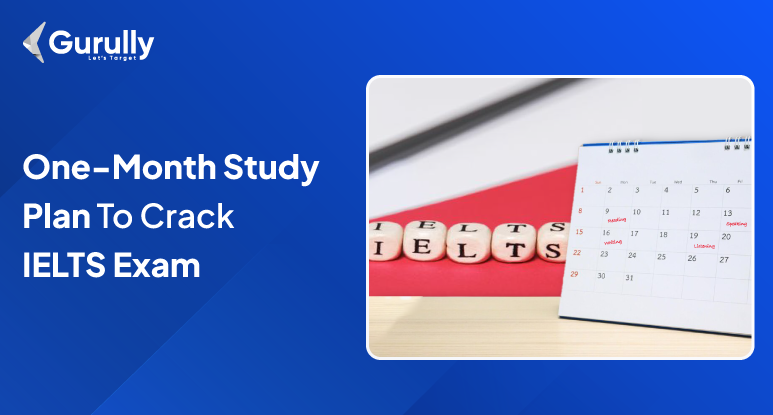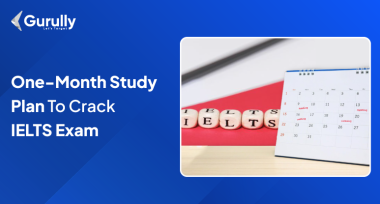Some of the best things in life are unplanned. If you have suddenly thought of going for the IELTS exam to grab a job or admission in a reputed overseas country and are taking a step back just because you have only one month, don’t do it. If you plan strategically, IELTS can be knocked down, and you can live your dreams. In this post, we have summed up the expert inputs for IELTS preparation in one month.
Know How to Prepare for IELTS in One Month
The first thing we would tell you when you start your IELTS Exam Practice is not to fret and roll up your sleeves, as the next four weeks will be a roller-coaster ride. You have to be committed and not waste a single second. Once you’re ready to do this, there is no stopping. Just follow the below-mentioned steps.
Week 1 – Getting to know about the IELTS Preparation in One Month
You can’t bring your enemy down if you don’t know your enemy well. This is why you must spend the first week getting familiar with the IELTS exam, its format, and question type. Spend some time on these resources.
IELTS Exam Overview
IELTS Exam Type
IELTS Academic Test Format
The first two days are enough for this task. The next 5 days should be invested in checking the existing competency in English. For this, the ideal way is to attempt the section-wise scoring test. Some of the best ones scored IELTS tests are offered here.
IELTS Listening Module
IELTS Reading Module
IELTS Writing Module
IELTS Speaking Module
Take the IELTS mock tests, analyze your performance, and determine the existing loopholes.
Week 2 and Week 3 – Work on the weak areas
Once you can figure out problem-causing areas, it’s time to work on them. We would suggest going section-wise. Give 3 days to each module.
Day 8 to 10 – Reading Section
- Read English newspapers, magazines, articles, and books daily for one hour.
- Do a passage reading and make your questions and figure out the answers.
- Refer to past IELTS tests and go through the IELTS Reading section.
- Pay attention to skim and scan reading.
Day 11 to 13 – Speaking Section
- Readout loud English newspapers
- Learn a few new words daily using the flashcards
- Watch English movies with subtitles and speak the subtitles
- Record and hear out your speeches repetitively
Day 14 to 16 – Writing Section
In this duration, you must try to know the problem/solution, advantage/disadvantage essay, formats of writing tasks 1 and 2, and process description essay to improve your IELTS writing score.
Write a sample essay for each type.
Day 17 to 19 – Listening Section
- Listen to monologues and conversations, samples offered on YouTube.
- Every day, listen to an English documentary for 30 minutes.
- Subscribe to a podcast of native speakers and pay attention to the use of words and their pronunciation.
- Subscribe to the online news channel of countries like Ireland, the US, Canada, New Zealand, and Australia and listen to the news daily.
Day 20 to 21 – Practice and Practice
Take scored practice tests daily, analyze your performance, and work on your issues. This is something that you can’t ignore. The more tests you will take, the better in-depth understanding you’ll be able to gain on your performance.
Week 4 – Review performance and improve it a bit more
Time is running out, and now you have to work very strategically. Wasting time is not an option. This is how you can utilize the last week of preparation:
- Listen to the Speaking and other recordings you did in the 2nd and 3rd weeks. Record the exact content once again and compare both recordings. Spot the errors, fluency, and new problems made.
- Based on the practice test performance, try to mend the loopholes. Keep a day reserve only for the areas where you lack the most.
On the exam eve
You have done enough hard work, and it’s time to relax. Whatever you have learned is enough. So, don’t read anything new. Take a sound sleep and keep any fear or anxiety at bay. This will help you deal with exam-day stress and not lose calm. Sleep early and ensure all the exam-day essentials are in place.
On the exam day
Wake up fresh, have a light breakfast, and prepare for the exam. Depending on the distance between your test center and your location, try to leave early.
We wish you good luck with this, and we guarantee you that if you’ve followed all the above tips and tricks, you’ll do well in the IELTS exam.
Ending Notes
The IELTS exam is the key to your dreams, and you must not let them go just because you have only 30 days for preparation. If you plan strategically, then 30 days are more than enough. All you need is a bit of commitment, hard work, and section-wise IELTS practice tests, which you can do on Gurully. All these things will prepare you for your exam even in 30 days.
Wondering how you’ll score in IELTS? Use our IELTS Band Score Calculator to find out instantly!
Conclusion
Preparing for the IELTS exam in one month might seem challenging, but with a well-structured plan and dedication, it is entirely achievable. By following a strategic approach, working on your weak areas, and practicing section-wise IELTS tests, you can boost your chances of success. Utilize the valuable resources available on Gurully to take practice tests, identify your problem areas, and improve your skills. Remember, consistency and commitment are key. Start your IELTS preparation in one month today, and you’ll be well on your way to achieving your desired score.
FAQ’S
How many hours should I study daily for the IELTS exam?
How is the IELTS test scored?
What score do I need to pass the IELTS test?
Can I retake the IELTS test if I'm unsatisfied with my results?
Is it easy to get 7.5 in IELTS?
Can I prepare for IELTS in 15 days?
IELTS plan for 1 month?
Can I get 6.5 in IELTS in first attempt?
Does Harvard accept 6.5 IELTS?
Also Read:
- Set Your Target Score – Know Scoring Pattern Of DUOLINGO Vs IELTS
- PTE vs CELPIP vs IELTS : Which Is Best English Test For Canada PR
- Know Difference Between IELTS and PTE Academic – Which is Easier










